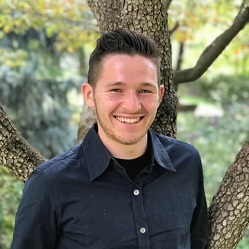

What happens when a fight breaks out in the admissions office. What admissions officers prefer not to see. How much time they truly spend reading each application. What types of applicants impress them the most. The most memorable encounter with an applicant. Whitman College admissions officer, Henry Whipple, continues to tell SocratesPost what’s behind the scenes in the admissions office. Catch up from last week’s conversation.

Exclusive Insider Interview: Admissions Officer, Whitman College (2/3)
SocratesPost: Was there ever a fight that broke out in the admissions office because someone really wanted someone and someone else who disagreed said, ‘you know what, let’s fight over this!’?
Henry at Whitman: Being my first year at Whitman, I haven’t seen it yet. The early decision committee, thankfully, was pretty smooth because we definitely hit the admissions priorities in terms of athletics and where the recruits come from. There were only one or two disagreements between athletics and certain talent scholarships that went out to students. The early decision round tends to have a higher acceptance rate because in a way it’s self-selecting. The students who apply have tended to usually be interested in Whitman for a long time and can really articulate why they see themselves thriving here. It’s easier to admit them just because they really advocated their way to Whitman. So, there wasn’t too much disagreement there. I would definitely expect there to be disagreement in the regular decision round, just because, again, we all have our interest from regional areas and different things that play in. It ultimately just comes down to laying the ground rules at the beginning and having all of the officers agree with each other that we’re going to have biases, we’re going to have certain attachments to kids and if it gets too heated, the director’s word is final. He’s been here for four or five years so he knows what the institution needs and what the president is looking for in terms of admissions and if a decision is made, it is for a reason. It’s not just throwing you down because you’re a new officer or because we don’t like your certain area – there’s always going to be a reason to it. Even if it’s difficult, he has to make sure we’re still respecting each other even if we have disagreements.
SocratesPost: How much time do you spend reading each application?
Henry at Whitman: I would say it differs. Some applications take longer to read because there’s just more of a personal background to it that they bring in and there’s context that we need to understand: their academics and their writing and their extracurriculars. So, especially if you’re unfamiliar with an area, it takes more time because you have to get to know what the area is like for a second before you actually read it. I would definitely say in the two to four-minute range or so is probably pretty typical for the essay. It’s pretty unlikely that it will go back and be fully reread for a second time.
Some essays are read once and then you go over it again to see if they can take anything important from it. Ideally, the biggest thing is you want to keep within the pretty short window of time. As an applicant, you were told in school to write a strong hook and grab your reader with the first paragraph, and in a way it’s true. You need to pull the officer in with some captivating way from the get-go so that they’re not going on autopilot reading the essay.
SocratesPost: What types of applicants impress you the most?
Henry at Whitman: One side of it is the ones who can articulate why they’ve pursued the things they have and why it motivates them. Even if a recruited athlete has been playing baseball since they were four years old, I want to know when I interview them or in their application why they choose to do so. Not to hang on their achievements and the fact that they want to play in college, but what makes them actually want to keep doing it. Being at Whitman especially, I would say perhaps more important to us than seeing ten AP’s on the schedule is you taking four or five that are particularly in your areas of interest. On the flip side of the extracurricular, if you have a certain academic interest in an area that you really want to study, it’s not the end of the world if you haven’t taken an AP in every single core subject if you’re able to show us why you took the ones you did and how it furthers your academic interests and what you want to study through college. Then you’ve reflected on where your academic strengths, weaknesses and interests lie and you’re ready to come into college where you pretty much have total control of how you structure your courses. You’re ready to come in, take full advantage of that, and own it.
SocratesPost: Yeah, that sounds different from many other admissions offices who say that the more APs you have, the better. Whitman wants to see your concentration of APs relating to what you are actually interested in, especially because you’re going to be at a liberal arts college and you have say over your coursework.
Henry at Whitman: Yeah, of course, the more APs you have, it definitely helps when we’re looking at your rigor. But it’s by no means a situation where we’re going to separate everyone who does nine APs from everyone who does five APs, then pretty much cross out the five APs. It’s important to get sleep as a high schooler and take care of yourself and not just run yourself into the ground. If you, as a student, are unable to manage that in high school, and you’ve spent so much time trying to up your rigor, then you can’t maintain a healthy mental lifestyle. We worry about that in college because at home, you have your family and other people that take care of you on a day-to-day basis and support you, but college is a time of independence. So, if you’re going to come into Whitman and struggle with that, it may not be the best fit.
SocratesPost: That’s valuable. What is something that you often see in applications or essays that you would prefer not to see?
Here’s a preview of the rest of our conversation! Subscribe to read the rest and support our ad-free newsletter.
SocratesPost: I get this question a lot from my readers: how do I find the best college fit for me? From your perspective as an admissions officer, what is the best way to figure out fit?
SocratesPost: Okay, yes, those sure are great: rigor, geography, community… For students who are out of state or are abroad, what is the best place for them to figure this out, if they can’t visit? Let’s say they only have access to the website and maybe emails of students or admissions officers. How can they best figure that out without having to fly the 3,000 miles to come visit campus?
SocratesPost: Can you tell me one memorable positive encounter with an applicant and one memorable negative encounter?
Stay tuned for more! Coming up next week: the remainder of our in-depth exclusive interview with admissions officer, Henry Whipple, at Whitman College.
